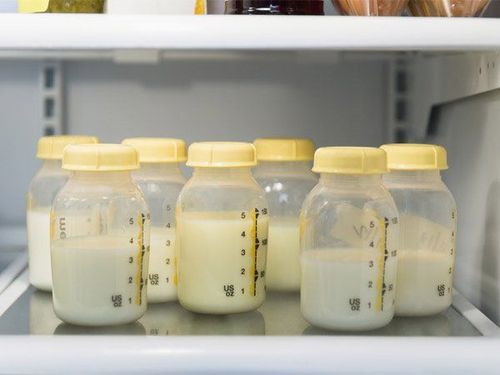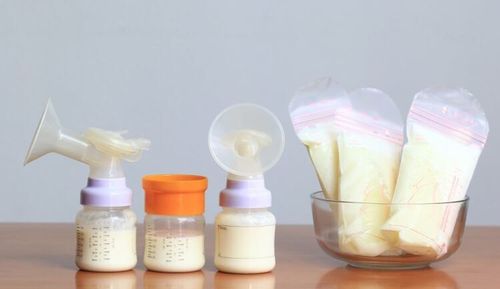This is an automatically translated article.
The article was professionally consulted with Master, Doctor Ngo Thi Oanh - Pediatrician - Department of Pediatrics - Neonatology - Vinmec Ha Long International General Hospital.Breast milk is the perfect source of nutrition for babies. Breast milk contains almost all the nutrients that a baby needs in the first months of life and contributes an important part to the development of the baby in the following months.
1. Causes of sour breast milk
Normally, breast milk has a milky white color, a rich aroma, a sweet and cool taste, not sour, which is different from other types of milk. Therefore, after giving birth, women can safely breastfeed their babies exclusively for the first few months of life, providing enough essential nutrients and helping them enjoy the delicious taste of cool milk. heal.Breast milk can change flavor depending on the location of each person. Occasionally, the mother will find that the milk is sour, it may be due to the diet that causes the quality of the milk to change. In addition, there are some other reasons that can also cause the mother to be sour.
1.1 Mother's milk is sour due to diet The amount of food the mother takes into her body every day has a great influence on the quality and taste of breast milk. If the mother eats too much food with a bad smell, such as: Fish, drinks fish oil, eats a lot of garlic, chili, hot spicy food... the taste of milk may be affected, not fragrant, even milk mother is also sour.

Nếu người mẹ ăn quá nhiều thực phẩm có mùi hôi, tanh thì mùi vị sữa có thể bị ảnh hưởng
1.3 Cleaning the breasts is not clean If the mother does not clean the breasts, especially the nipple, the amount of milk that leaks out is not cleaned, causing unpleasant odors and also creating conditions for bacteria, mold growth, affecting milk quality, making breast milk sour, babies may refuse to breastfeed.
2. Is breast milk stale?
Breast milk is stale, sour when expressed for too long or does not store milk properly. If breast milk is damaged or expired, it is absolutely forbidden to feed the baby.3. Is breast milk good for a long time?
Hot storage of breast milk in a bottle can only be used for a short time. If mothers do not plan to give milk to their babies immediately after expressing, they should store milk in the refrigerator as soon as possible.Normally, left at outdoor temperature, if it is sunny, about 37 degrees Celsius, breast milk left outside for 30 minutes is starting to show signs of sourness. Children under 6 months old, drinking this milk will have diarrhea. Whether you cover it or not, 30 minutes is enough time for the bacteria to break down and ferment.
If the temperature is lower, the air is drier, the time you leave it outside can reach 1 hour. For example, if the outdoor temperature is cool at 25 degrees Celsius, 1 hour is probably safe. But from 1 hour onwards, milk is no longer safe.
Milk will start to spoil, have a sour smell, get fermented and any child who drinks it will have diarrhea if it is left out for 4 hours or more. So, under no circumstances should you leave the milk out for longer than 4 hours.
Immediately after squeezing out, close the lid, cover tightly, put in the refrigerator, cool compartment, set to medium mode, equivalent to a temperature of 15 degrees. At this temperature, breast milk can be kept for 24-48 hours. Should not be left to the 3rd day. Absolutely not for more than 72 hours, very dangerous. When taking it out, pour it into a jar or a cup. The rest must be refrigerated immediately. When taking it out, soak it in warm water to warm the milk, don't let it cool down naturally, long and unsafe. It is best to drink breast milk within 18-24 hours, stored in the refrigerator is very safe for babies.
3.1 Store in the refrigerator compartment Store in the refrigerator compartment: Breast milk can be kept for 1-3 days.
3.2 Store breast milk in the freezer

Dự trữ sữa mẹ trong ngăn đá thời gian tối đa có thể lên tới 3 tháng
When you want to put milk in the freezer, you should put the milk in the cooler first and then transfer it to the freezer. Similarly, when you want to defrost, you should bring milk from the freezer to the cooler for less than 24 hours before bringing the milk out.
However, you should not store breast milk for too long, but should give it to your baby as soon as possible.
4. Proper storage
If breast milk secretion causes breast engorgement and does not immediately breastfeed or express milk, the body has a mechanism to gradually reduce milk production. Anxiety also reduces breast milk supply. Mothers should have a diet, rest and take reasonable measures to protect their milk supply. When the mother is not at home, the baby can use the stored milk.4.1 How to express After milk has been expressed (manually or by machine) immediately put it in the refrigerator to start the preservation process. When in the outside environment for a long time, the quality of milk will not be as guaranteed as when the baby is suckling directly.
Expressed breast milk can both be stored, in case the mother is not at home, and also help with milk blockage. Well-preserved breast milk can be saved for babies to drink more when the mother is not around.
4.2 How to store Breast milk after expressing, if it is kept at a normal temperature of about 26°C, it is only safe to use for 4-6 hours, about 22°C, it can be used for 6-8 hours. Breast milk stored in the regular compartment of the refrigerator can be used within 24 hours.
If stored in the freezer, this amount of milk can be used gradually in about two weeks. When stored in a specialized freezer at -18°C, breast milk can be kept for up to six months.
5. Don't waste colostrum
Usually, from the fourth month of pregnancy, the mother begins to have colostrum, with more energy and antibodies. Right after birth, colostrum is ready to meet your baby's needs. Newborn babies need only a few ml of colostrum. If you breastfeed early, breast milk comes in faster. At the same time, the baby will be protected against diseases due to the very high content of antibodies in colostrum. Therefore, doctors advise mothers to breastfeed as soon as possible after birth, as soon as possible, within the first half hour. Do not give the baby any other milk or water to drink because this will both waste colostrum and lose the mother's lactation reflex, which slows down the return of milk.Not to mention the source of food brought in from outside cannot be hygienic and fresh like breast milk, children who eat outside food too full will sleep all the time, are lazy to breastfeed and may criticize breast milk later.
The nutritional composition of breast milk varies slightly, depending on the time of the first and last day of feeding, as well as between different mothers, but is adjusted to suit the needs of the baby. During each stage of child development, breast milk also changes to meet two nutritional and immune needs. For mothers who give birth prematurely, in the first few weeks, mothers will have "preterm" milk that has a higher protein content than regular milk.

Các bà mẹ cho con bú sớm ngay sau sinh, càng sớm càng tốt, trong vòng nửa giờ đầu
6. Don't worry about lack of milk
Scientists around the world have conducted many studies and have come to the conclusion that most mothers have enough milk for their babies if they know how to breastfeed properly. The number of lactating cells in all mothers' breasts is the same, about 2 million, regardless of how big or small the breasts are. When breastfeeding a lot and suckling milk in the breast, especially at night, breast milk will be continuously produced to meet the needs of the baby. Mothers only need to eat 1-2 more cups of rice each meal.However, psychology plays a very important role in lactation, if a mother believes that she has enough milk for her baby and is mentally happy, then more milk will be secreted. Therefore, it is necessary to create an atmosphere of comfort and belief in breastfeeding for mothers.
Folk foods that have beneficial effects on milk are mainly psychological. Foods that are not toxic (stimulants, alcohol, some spices with strong flavors can change the smell of breast milk...) that mothers trust to produce more milk will help mothers have more more milk.
For more nutritional knowledge and child care for each age, parents should regularly visit the website vimec.com and make an appointment with the leading doctors, pediatric and nutrition experts of the National General Hospital. Vinmec when needing advice on children's health.













